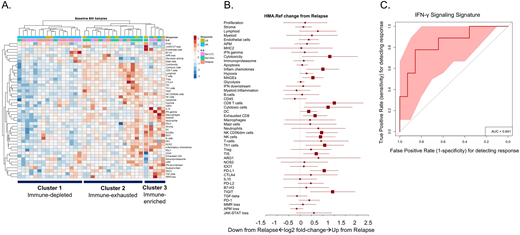Abstract
Background. The therapeutic approach in patients (pts) with acute myeloid leukemia (AML) has not changed substantially in >30 years. The introduction of new treatment strategies, including immunotherapy, remains a priority. Flotetuzumab, a CD123 × CD3 bispecific DART immunotherapy, is being tested in a phase 1/2 study of relapsed/refractory (R/R) AML. We previously showed that AML pts with an immune-enriched and IFN-γ-dominant tumor microenvironment (TME) experience significantly shorter relapse-free survival, suggesting refractoriness to standard induction chemotherapy (Vadakekolathu J, et al. Blood 2017; 130: 3942A). Herein, we report that an IFN-γ-dominant TME, while predicting resistance to standard therapy, is favoring response of AML to flotetuzumab.
Methods. Gene expression was analyzed in 78 bone marrow (BM) samples (36 at baseline, 27 post-cycle 1 and 15 post-cycle 2) from 40 pts with relapsed or refractory AML enrolled in a phase 1/2 clinical trial of flotetuzumab (NCT#02152956). Thirty-six baseline BM samples were included in the analysis, of which 34 from pts who were treated at the target dose of ≥500 ng/kg/day. The NanoString PanCancer IO360™ assay was used to assess the expression of 770 genes, including the levels of 14 immune cell types and of 32 immuno-oncology signatures, and their correlation with response to flotetuzumab. Data are presented as score means per group±SEM and analyzed by unpaired t-test.
Results. Gene expression analysis of BM samples at baseline stratifies flotetuzumab-treated pts into 3 clusters within an immunological continuum: immune-depleted, immune-exhausted and immune-enriched (Fig. 1A). Pts with primary-refractory disease (refractory to ≥2 induction attempts, first CR of <6 months, or failure after ≥4 cycles of hypomethylating agents, HMA) showed prevalently an immune-infiltrated TME phenotype, which included higher inflammatory chemokine scores compared with relapse pts (3.27±0.22 vs 2.46±0.07, p=0.026). Within this group, chemotherapy-refractory and HMA-refractory pts further stratify into immune-enriched and immune-exhausted phenotypes, respectively. Specifically, HMA-refractory pts displayed features of immune exhaustion and adaptive immune resistance, including upregulation of TIGIT (5.55±0.34 vs 3.85±0.24, p=0.006), PD-L1 (3.55±0.18 vs 2.4±0.29, p=0.009) and Treg cells (4.87±0.23 vs 3.69±0.19, p=0.0009) together with a trend toward increasingly exhausted CD8+ T cells (CD244, EOMES, LAG3 and PTGER4) compared to chemotherapy-refractory pts (Fig. 1B). Responders to flotetuzumab showed a significantly higher IFN-γ signaling scores at baseline compared to non-responders (3.31±0.32 vs 2.27±0.11, p=0.0005), consistent with the greater frequency of responders in primary refractory pts compared to relapse pts. Accordingly, baseline IFN-γ signaling scores may be predictive of response to flotetuzumab therapy (AUC=0.841; Fig. 1C). Furthermore, comparison of post-cycle 1 BM samples to baseline samples showed treatment with flotetuzumab lead to increased immune cell infiltrate and immune activation scores, as reflected by a higher Tumor Inflammation Signature (Ayers M, et al. J Clin Invest 2017; 127: 2930-40) (6.49±0.20 vs 5.93±0.12, p=0.015) together with enhanced immunoproteasome (5.72±0.07 vs 5.23±0.10, p=0.0002) and IFN-γ signaling (3.38±0.23 vs 2.53±0.14, p=0.0015) scores. Flotetuzumab-induced TME gene activation was therefore reminiscent of an immune-enrichment rather than immune-exhaustion signature.
Conclusions. We provide evidence for a range of immune gene expression profiles in AML, with primary refractory pts displaying an enhanced immune infiltration signature compared with relapse pts. Furthermore, an IFN-γ-related gene signature at baseline, a feature of primary refractory pts, was associated with clinical response to flotetuzumab. HMA-refractory pts showed an immune-rich but exhausted phenotype with PD-L1 expression, suggesting these pts may further benefit from flotetuzumab combination therapy with checkpoint inhibition (Rettig M, et al. Blood 2017; 130: 1365). Lastly, treatment with flotetuzumab further shifted the immune signature toward a more immune rich phenotype. The AML TME immune gene expression can influence susceptibility to therapy, with primary refractory AML showing an IFN-γ-dominant signature associated with response to flotetuzumab.
Rutella:NanoString Technologies: Research Funding. Church:NanoString Technologies: Employment. Viboch:NanoString Technologies: Employment. Sullivan:NanoString Technologies: Employment. Hood:NanoString Technologies: Employment. Warren:NanoString Technologies: Employment. Cesano:NanoString Technologies: Employment. La Motte-Mohs:MacroGenics: Employment, Equity Ownership. Muth:MacroGenics: Employment. Lelièvre:Servier: Employment. Lowenberg:Royal Academy of Sciences and Arts, The Netherlands: Membership on an entity's Board of Directors or advisory committees; Agios Pharmaceuticals: Membership on an entity's Board of Directors or advisory committees; international Scientific Advisory Board, Institute Gustave Roussy, Paris: Membership on an entity's Board of Directors or advisory committees; Clear Creek Bio Ltd: Consultancy, Honoraria; Chairman Scientific Committee and Member Executive Committee, European School of Hematology (ESH, Paris, France): Membership on an entity's Board of Directors or advisory committees; Editorial Board "European Oncology & Haematology": Membership on an entity's Board of Directors or advisory committees; Editorial Board "The Netherlands Journal of Medicine": Membership on an entity's Board of Directors or advisory committees; Elected member, Royal Academy of Sciences and Arts, The Netherlands: Membership on an entity's Board of Directors or advisory committees; Supervisory Board, National Comprehensive Cancer Center (IKNL), Netherlands: Membership on an entity's Board of Directors or advisory committees; Chairman, Leukemia Cooperative Trial Group HOVON (Netherlands): Membership on an entity's Board of Directors or advisory committees; Editorial Board "International Journal of Hematology": Membership on an entity's Board of Directors or advisory committees; "Up-to-Date", section editor leukemia: Membership on an entity's Board of Directors or advisory committees; Astex: Consultancy; Celgene: Membership on an entity's Board of Directors or advisory committees. Davidson-Moncada:MacroGenics: Employment.
Author notes
Asterisk with author names denotes non-ASH members.


This feature is available to Subscribers Only
Sign In or Create an Account Close Modal